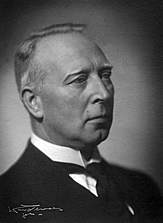
Nazi Germany, officially known as the German Reich from 1933 until 1943, and the Greater German Reich from 1943 to 1945, was the German state between 1933 and 1945, when Adolf Hitler and the Nazi Party controlled the country, transforming it into a dictatorship. Under Hitler's rule, Germany quickly became a totalitarian state where nearly all aspects of life were controlled by the government. The Third Reich, meaning "Third Realm" or "Third Empire", alluded to the Nazis' conceit that Nazi Germany was the successor to the earlier Holy Roman Empire (800–1806) and German Empire (1871–1918). The Third Reich, which Hitler and the Nazis referred to as the Thousand Year Reich, ended in May 1945 after just 12 years, when the Allies defeated Germany, ending World War II in Europe.

Johan Ludwig Mowinckel (22 October 1870 – 30 September 1943) was a Norwegian statesman, shipping magnate and philanthropist. He served as the 16th prime minister of Norway during three separate terms.

Jens Valentinsen Hundseid was a Norwegian politician from the Agrarian Party. He was a member of the Norwegian parliament from 1924 to 1940 and the 20th prime minister of Norway from 1932 to 1933.

The Liberal Party is a centrist political party in Norway. It was founded in 1884 and it is the oldest political party in Norway. It is positioned in the centre on the political spectrum, and it is a liberal party which has over the time enacted reforms such as parliamentarism, freedom of religion, universal suffrage and state schooling.

The Minister of Foreign Affairs is a councilor of state and chief of the Norway's Ministry of Foreign Affairs. Since 14 October 2021, the position has been held by Anniken Huitfeldt of the Labour Party.

The Nuremberg Laws were antisemitic and racist laws that were enacted in Nazi Germany on 15 September 1935, at a special meeting of the Reichstag convened during the annual Nuremberg Rally of the Nazi Party. The two laws were the Law for the Protection of German Blood and German Honour, which forbade marriages and extramarital intercourse between Jews and Germans and the employment of German females under 45 in Jewish households; and the Reich Citizenship Law, which declared that only those of German or related blood were eligible to be Reich citizens. The remainder were classed as state subjects without any citizenship rights. A supplementary decree outlining the definition of who was Jewish was passed on 14 November, and the Reich Citizenship Law officially came into force on that date. The laws were expanded on 26 November 1935 to include Romani and Black people. This supplementary decree defined Romanis as "enemies of the race-based state", the same category as Jews.

Knut Liestøl was a Norwegian folklorist, Nynorsk proponent and politician.

Gunnar Jahn was a Norwegian jurist, economist, statistician, politician for the Liberal Party and resistance member. He held several important positions, such as Norwegian Minister of Finance and Customs from 1934 to 1935 and in 1945, chair of the Norwegian Nobel Committee from 1941 to 1966 and Governor of the Central Bank of Norway from 1946 to 1954.

Arne Toralf Sunde was a Norwegian politician, Olympic shooter and army officer. He is best known for his participation in the 1940 Norwegian Campaign, his participation in Nygaardsvold's Cabinet during its 1940–1945 exile in London and three years as a United Nations ambassador. Sunde was President of the United Nations Security Council in June 1949 and July 1950.

The Nesttun–Os Line was a narrow gauge railway between Nesttun, now part of Bergen, and the community of Osøyro in Os municipality, Norway. As the first private railway in Norway, it opened 1 June 1894, designed to connect Os to the Voss Line, allowing for passenger and freight transport to Bergen and Voss. Despite a boom caused by World War I, the railway was eventually driven out of business by competition from road transport, which provided faster service. On 2 September 1935, it became the first Norwegian railway to close, and most of the railway was dismantled the following year.
Victor Laurence August Christgau was a politician and government official from Minnesota.

Sigmund Olaf Plytt Mowinckel was a Norwegian professor, theologian and biblical scholar. He was noted for his research into the practice of religious worship in ancient Israel.

Mowinckel's First Cabinet governed Norway between 25 July 1924 and 5 March 1926. It had the following composition:

Agnes Mowinckel was a Norwegian actress and theatre director. Born in Bergen into a distinguished family, she became Norway's first professional stage director. A pioneer in bringing painters to the theatre, she used light as an artistic element, and engaged contemporary composers. She took part in theatrical experiments, worked at small stages in Oslo, and founded her own theatre.
Johan Ernst Mowinckel was a Norwegian merchant and politician from Bergen. He was the great grandson of Johan Ernst Mowinckel (1759–1816), and the brother of actress Agnes Mowinckel.

The Minister of Agriculture and Food is a councilor of state and chief of the Norway's Ministry of Agriculture and Food. The ministry is responsible for issues related to agriculture, forestry and food. Major subordinate agencies include the Norwegian Agriculture Authority, the Norwegian Food Safety Authority and Statskog. The position was created on 31 March 1900, along with the ministry, and Ole Anton Qvam was the inaugural officeholder. Fifty people from eight parties have held the office. During the German occupation of Norway from 1940 to 1945, the office was both held by a German puppet government and an elected government in London.

Ragnhild Mowinckel is a Norwegian World Cup alpine ski racer, representing the club SK Rival.
Kringkastingsselskapet A/S was Norway's first radio broadcasting service and operated out of Oslo from 1925 until 1933, when it was taken over by the Norwegian Broadcasting Corporation (NRK).
Hans Jørgensen Aarstad was a Norwegian politician for the Liberal Party. He served as Minister of Agriculture from February 1928 to May 1931 in Mowinckel's Second Cabinet.














